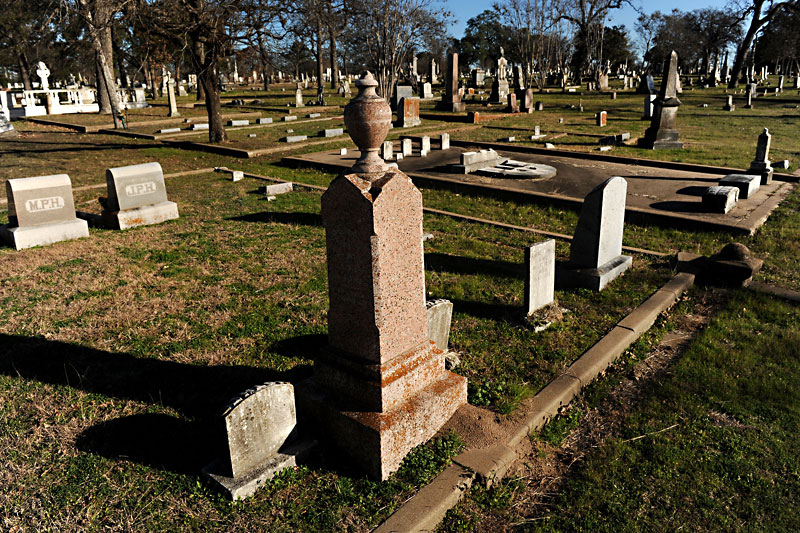Cemetery Master Plan Inches Closer to Life
Boards & commissions pass graveyard draft
By Richard Whittaker, Fri., July 3, 2015
Austin's cemeteries are one step closer to securing their future, as the city's massive graveyard master plan passed out of boards and commissions last week, and now heads to Council.
The draft plan is the end result of a vast amount of consultation over how Austin should handle its cemeteries (see "Death Waits for No Plan," Feb. 6). This is the only major city in Texas that still has working, municipally owned cemeteries. Covering the five graveyards within city limits – Oakwood, Oakwood Annex, Plummers, Evergreen, and Austin Memorial Park – the document is both a long-term business plan and a conservation proposal for these invaluable and historic green spaces.
The Parks and Recreation Department's Project Coordinator & Cultural Resource Specialist Kim McKnight said that, since April, "We've been going through the boards and commissions process, and it's been really smooth." The core recommendation remains intact: The city should continue running the sites as working cemeteries until all the plots are full, and then convert them into historic and cultural resources. There were minor recommendations during the board hearing process period, McKnight said, "but nothing earth-shattering." Urban Forestry added specific language about the use of mulch and composting during dry periods, while the Environmental Board wanted a full irrigation study. However, it's not just about keeping plants alive, or conserving water during drought, McKnight said: "You've got things that do well with water and things that don't do well with water." Drench tree roots, and they may prosper; drench the soil beneath a tall headstone or monolith, it may get too soft, and could collapse.
The plan had its last major hearings last week, with both the Planning Commission, and City Council's new Open Space, Environment, and Sustainability Committee giving approval. During that latter meeting, Chair Leslie Pool called it "a large and complex plan [that] really does provide a long-term framework for the cemeteries." Debate and dissent at this final step was short: The committee took staff and public testimony, and voted the plan out unanimously, in a little over half an hour.
It's a personal as well as professional issue for Council Member Pool: Not only is Austin Memorial the largest working cemetery in Pool's district, but both her parents are interred there. While the topic may seem morbid, she compared it to the bike master plan: Without it, the city cannot really grasp its commitments or opportunities. She praised the work of McKnight and her team, calling the scale of the work and the volume of the community outreach "pretty unprecedented."
And it's not just Council that's praising the plan. It's rare for a major American city to produce such a master plan, and it's been garnering national attention. In March, urban planning journal Next City published a feature on the draft, and other journals have expressed an interest in talking to McKnight and her team. In addition, her office received calls from city management as far away as Lubbock and even Colorado, asking about their process. McKnight said, "It's nice to see our work getting attention."
Now the amended master plan heads to full Council, with a hearing tentatively scheduled for September. There are still some kinks to be ironed out. The Historic Landmark Commission had recommended that Austin Memorial, Evergreen, and Plummers all be designated as historic, joining Oakwood and Oakwood Annex. But as McKnight noted to Pool's committee, that process is driven by friends' groups, which neither of those three facilities currently have.
Then there's the big question: How will the city pay for this? The city has no plans to buy or open any other cemeteries, so eventually all five sites will fill up. That means eventually no more revenue from plot sales or burials. However, the city is legally obligated to maintain them in perpetuity.
In addition, the current plan contains recommendations for capital investment, including a new columbarium to hold ashes at Austin Memorial, and historic renovations at Oakwood, Oakwood Annex, and Evergreen. Pool said she expected the master plan to trigger a fuller financial discussion at Council during the budget cycle. She's determined that the city should live up to its legal and moral responsibility to maintain what she called "places of serenity and reverence." In 2010, Pool was part of the city's bond committee, which started the process of ditching San Marcos-based Intercare Corp. from maintaining the spaces. She is firm that the city should not go back to using an external contractor. "I'm not a huge fan of privatizing government jobs," she said, "and I think we would be much better stewards."
Got something to say on the subject? Send a letter to the editor.










